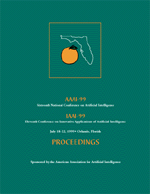Proceedings:
Proceedings of the AAAI Conference on Artificial Intelligence, 16
Volume
Issue:
Proceedings of the AAAI Conference on Artificial Intelligence, 16
Track:
Hybrid Methods
Downloads:
Abstract:
Fuzzy rule-based systems have been mainly used as a convenient tool for synthesizing control laws from data. Recently, in a knowledge representation-oriented perspective, a typology of fuzzy rules has been laid bare, by emphasizing the distinction between implicative and conjunctive fuzzy rules. The former describe pieces of generic knowledge either tainted with uncertainty or tolerant to similarity, while the latter encode examples-originated information expressing either mere possibilities or how typical situations can be extrapolated. The different types of fuzzy rules are first contrasted, and their representation discussed in the framework of possibility theory. Then, the paper studies the conjoint use of fuzzy rules expressing knowledge (as fuzzy constraints which restrict the possible states of the world), or gathering examples (which testify the possibility of appearance of some states). Coherence and inference issues are briefly addressed.

AAAI
Proceedings of the AAAI Conference on Artificial Intelligence, 16
ISBN 978-0-262-51106-3
July 18-22, 1999, Orlando, Florida. Published by The AAAI Press, Menlo Park, California.
